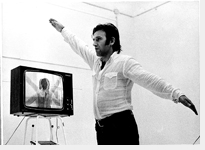

| Exhibition
| Chronology | Works
| Catalog
| Literature
| Press
| Trailer Visitor Information | Program | Partner | Credits | Deutsch |
|
Peter Weibel  Peter Weibel was essentially participating in three avant-garde movements during the 1960s: the development of visual poetry, Viennese film formalism, and Vienna Actionism, a term he invented. Beginning in the mid-1960s, he developed the independent extension of film via filmic events and installations, while simultaneously producing a series of conceptual photographic and verbal works. His first videos were produced in 1969, and he achieved an exceptional notoriety with his body- and media-centered works. During the 1970s he created the feature films Unsichtbare Gegner [Invisible Opponents, 1976-77] and Menschenfrauen [Female Humans, 1980] together with Valie Export, parallel to his works in videotape, video installations, video performances, and further avant-garde films. In the 1980s he began to work with digital media, which was not hard for him given his education in mathematics from the 1960s. In 1974 he published Studien zur Automatentheorie [Studies in Automation Theory], and thereby became one of few media artists who were prepared for the digital era. This led to his being invited to replace Hollis Frampton in the Digital Arts Laboratory of the Department of Media Studies at SUNY, Buffalo in 1984, where he taught until 1989 after numerous guest professorships in Canada, Germany, and Austria and participation in many media festivals. During this period he produced many video operas, from Der künstliche Wille [The Artificial Will, 1984] to Stimmen aus dem Innenraum [Voices from the Interior, 1988], culminating in his videographic masterpiece Gesänge des Pluriversums [Songs of the Plural Universe, 1986-88], a narrative of technographic transformation since 1800 using the means of audiovisual special effects. In addition to his artistic activities, from the beginning Weibel had copiously published theoretical texts. His curatorial activities began increasingly in the late1980s, which led to his directing cultural institutions in the 1990s. Since 1999, he has been Chairman of the Board of the ZKM | Center for Art and Media Karlsruhe. Peter Weibel was essentially participating in three avant-garde movements during the 1960s: the development of visual poetry, Viennese film formalism, and Vienna Actionism, a term he invented. Beginning in the mid-1960s, he developed the independent extension of film via filmic events and installations, while simultaneously producing a series of conceptual photographic and verbal works. His first videos were produced in 1969, and he achieved an exceptional notoriety with his body- and media-centered works. During the 1970s he created the feature films Unsichtbare Gegner [Invisible Opponents, 1976-77] and Menschenfrauen [Female Humans, 1980] together with Valie Export, parallel to his works in videotape, video installations, video performances, and further avant-garde films. In the 1980s he began to work with digital media, which was not hard for him given his education in mathematics from the 1960s. In 1974 he published Studien zur Automatentheorie [Studies in Automation Theory], and thereby became one of few media artists who were prepared for the digital era. This led to his being invited to replace Hollis Frampton in the Digital Arts Laboratory of the Department of Media Studies at SUNY, Buffalo in 1984, where he taught until 1989 after numerous guest professorships in Canada, Germany, and Austria and participation in many media festivals. During this period he produced many video operas, from Der künstliche Wille [The Artificial Will, 1984] to Stimmen aus dem Innenraum [Voices from the Interior, 1988], culminating in his videographic masterpiece Gesänge des Pluriversums [Songs of the Plural Universe, 1986-88], a narrative of technographic transformation since 1800 using the means of audiovisual special effects. In addition to his artistic activities, from the beginning Weibel had copiously published theoretical texts. His curatorial activities began increasingly in the late1980s, which led to his directing cultural institutions in the 1990s. Since 1999, he has been Chairman of the Board of the ZKM | Center for Art and Media Karlsruhe. |
|